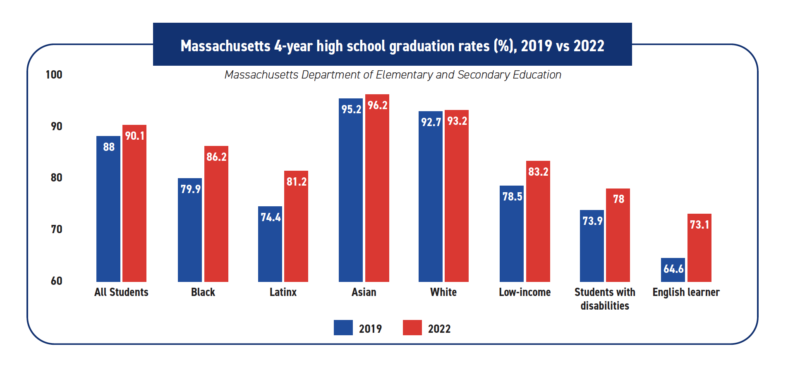Citizens for Public Schools has fought the MCAS graduation requirement since its inception. We believe students who meet the state academic standards by passing all their required courses have earned their diplomas and should receive them.
We attempted to calculate the number of students deprived of their diplomas over the past 20 years because of MCAS. We used publicly available statistics published by the Department of Elementary and Secondary Education (DESE).
We calculated the number of students who were enrolled as high school seniors but were not eligible for a diploma because they had not passed the required MCAS tests. According to the Boston Globe, our estimate was too high because it includes students who had not yet met other graduation requirements. This was an unintentional mistake on our part.
The Globe says it learned from DESE that the number of students denied diplomas because of MCAS was “only” 702 for one year – 2019.
Those are 702 young people whose lives have been damaged. Has the Globe ever spoken with any of these students? We have. One young woman had her career as a hairdresser and makeup artist delayed by six years because she couldn’t pass the math MCAS. Without a diploma, she couldn’t earn enough money or qualify for financial aid to get the training she needed.
We also heard from a mother whose daughter was ready to give up midway through her senior year after failing the math MCAS repeatedly by a few points.
We are glad that DESE has revealed how many students did not get their all-important diploma solely due to MCAS in 2019. We call on DESE to publish the total number of students denied diplomas because of MCAS for each year since 2003, when MCAS became a graduation requirement. DESE should also publish that number every year from now on.
If over 700 students in a single year were denied a diploma because they didn’t pass MCAS, it is clear that since MCAS became a graduation requirement 20 years ago, many thousands have been deprived of the diploma they needed to take the next step in their lives. They might have gotten an entry-level job in a field they loved, or needed financial aid for job training, or wanted to enter an apprenticeship, or attend college, or tried to take another path towards a rewarding career, but could not move forward without a diploma.
These are some of the human costs of the test-and-punish regime.
The Globe’s number doesn’t include students who dropped out before senior year because they thought there was no point in staying, or seniors who stopped trying to pass their courses because they couldn’t pass the MCAS.
One way to see the extent of the harm is to look at what happened in the classes of 2020, 2021, and 2022. These students had to meet all local requirements, but because of the pandemic, they did not have to pass the MCAS. As a result, the graduation rate went up for all students. The rise was especially sharp for English learners, low-income students, and students of color, narrowing graduation rate gaps by race, income, language, and disability. These are the groups that MCAS-driven educational reform was supposed to help, and instead they are the ones who are most likely to be denied a diploma because of the MCAS graduation requirement.

There are also thousands of students who eventually do pass but have their high school education degraded because of the MCAS. Students who fail the first time are often slotted into test prep classes where their sole focus is the narrow range of questions they are likely to find on their next MCAS, not the kinds of communication, mathematics, or science that will help them become successful adults.
These students could have taken career exploration, project-based engineering, persuasive writing, financial literacy, or many other courses that would expand their potential and horizons. They only get one chance at a high school education. MCAS prep is a waste of their time.
These students, too, are harmed.
Polls show that most students, parents, teachers, and business leaders agree that there’s too much stress on standardized test scores.
Who doesn’t agree? State officials and Globe editorial writers.

